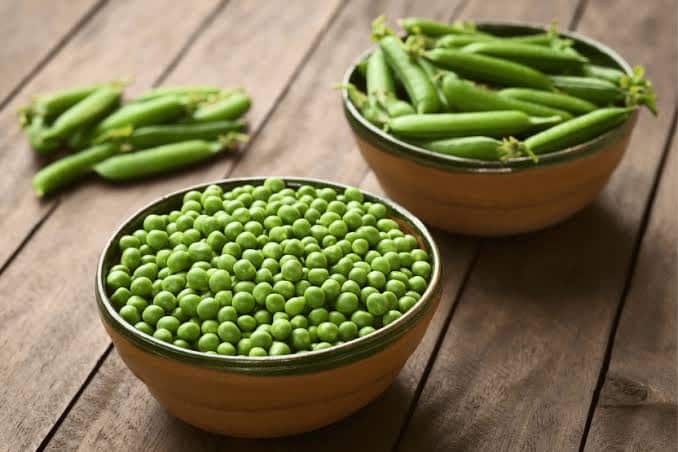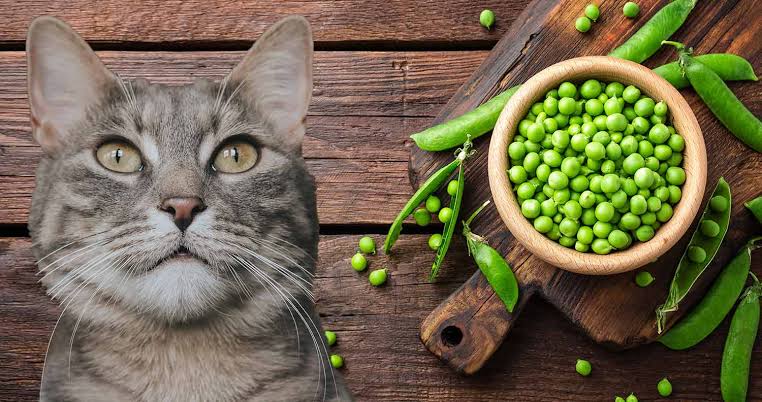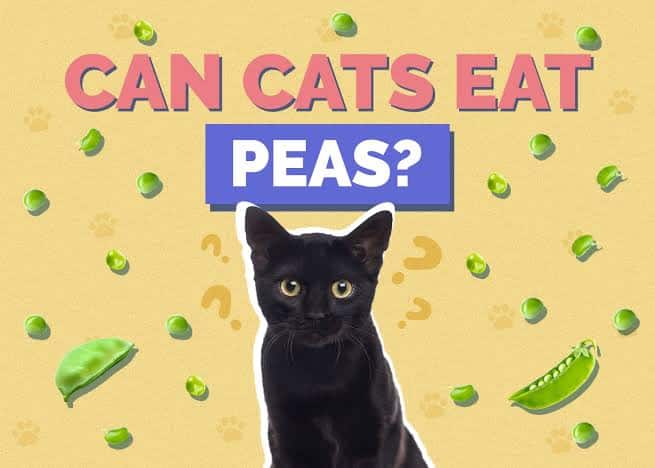Questions often arise about whether certain human foods are safe for cats to eat. Peas, with their vibrant color and sweet taste, are a common ingredient in many human dishes. But Can Cats Eat Peas? Let’s delve into this topic to understand whether cats can eat peas.
Overview Of Can Cats Safely Eat Peas
Peas are a type of legume that is rich in essential nutrients, including vitamins, minerals, and dietary fiber. They offer a host of potential health benefits for humans, such as supporting digestive health, providing antioxidants, and promoting heart health. However, when it comes to cats, the question of whether peas are safe to eat requires careful consideration.
While they can consume small amounts of plant matter, such as fruits and vegetables, their nutritional needs are best met by animal-based proteins and fats. Therefore, while peas may offer some nutritional value, they should not be a significant component of a cat’s diet.
Feeding peas to cats in moderation as an occasional treat is unlikely to cause harm, especially if they are cooked and mashed to make them easier to digest. Peas can provide a source of fiber, vitamins, and minerals that may offer some benefits for cats, such as aiding in digestion and supporting overall health.

Why Some Human Foods May Not Align With Cat Dietary Needs
While it’s tempting to share our favorite foods with our feline companions, not all human foods are suitable for cats. Understanding why certain foods may not align with cat dietary needs is essential for ensuring the health and well-being of our furry friends.
Nutritional Requirements:
Unlike omnivores, cats have specific nutritional requirements that are best met by animal-based proteins and fats. While some human foods may offer nutrients that cats need, such as vitamins and minerals, they often lack the essential amino acids and other nutrients that cats require in abundance. Feeding cats a diet that does not align with their nutritional needs can lead to deficiencies, health issues, and malnutrition.
Digestive System:
Cats have a shorter digestive tract compared to humans and other animals, which is optimized for processing meat-based diets. While cats can digest small amounts of plant matter, their digestive systems are not designed to efficiently break down and extract nutrients from certain types of carbohydrates, such as grains and vegetables. Feeding cats foods that are high in carbohydrates or difficult to digest can lead to gastrointestinal upset, diarrhea, and other digestive issues.
Allergies And Sensitivities:
Feeding cats foods that they are allergic or sensitive to can lead to adverse reactions, such as itching, vomiting, diarrhea, or skin problems. Common allergens for cats include dairy products, wheat, soy, and certain proteins found in grains or vegetables. Therefore, it’s essential to be mindful of potential allergens when introducing new foods into your cat’s diet and to monitor their response closely.
Toxicity Risks:
For example, foods like chocolate, grapes, raisins, onions, garlic, and certain types of nuts can cause serious health issues or even be fatal if ingested by cats. Other foods, such as caffeine, alcohol, and xylitol (a sweetener found in some sugar-free products), can also pose significant risks to cats. Therefore, it’s crucial to be aware of potential toxicity risks and to keep harmful foods out of your cat’s reach.
Recommended: Can Cats Eat Chocolate?
Nutritional Profile Of Peas
Peas are a versatile and nutritious legume that can be enjoyed in a variety of dishes, from salads and soups to side dishes and main courses. They boast an impressive nutritional profile, making them a valuable addition to any diet. Here’s a closer look at the key nutrients found in peas:
Protein:
Peas are an excellent source of plant-based protein, making them a valuable protein source for vegetarians and vegans. A one-cup serving of cooked peas contains approximately 8 grams of protein, which is comparable to the protein content found in other legumes like beans and lentils.
Fiber:
Peas are rich in dietary fiber, with one cup of cooked peas providing around 9 grams of fiber. Fiber is essential for promoting digestive health, regulating bowel movements, and preventing constipation. It also helps lower cholesterol levels, control blood sugar levels, and support weight management by promoting feelings of fullness and satiety.
Vitamins:
Peas are a good source of various vitamins, including:
Vitamin A, Vitamin C, Vitamin K, etc.
Minerals:
Peas are rich in essential minerals, including:
- Iron: Important for oxygen transport in the blood and energy metabolism.
- Potassium: An electrolyte mineral that helps regulate blood pressure and maintain proper muscle function.
- Magnesium: Essential for muscle and nerve function, bone health, and energy metabolism.
Antioxidants:
Peas contain various antioxidants, including flavonoids, carotenoids, and phenolic compounds, which help protect cells from damage caused by free radicals. These antioxidants have anti-inflammatory and anti-cancer properties and may help reduce the risk of chronic diseases such as heart disease, cancer, and diabetes.
Recommended: Can Cats Eat Popcorn?
Factors To Consider When Incorporating Peas Into A Cat’s Diet
Nutritional Needs:
Cats require a diet that is rich in animal-based proteins and fats to meet their dietary needs adequately. While peas contain some protein and fiber, they do not provide the essential nutrients that cats need in abundance. Therefore, peas should only be considered as a supplemental treat and should not replace the primary sources of nutrition in your cat’s diet.
Digestive Health:
Cats have sensitive digestive systems that may not tolerate certain foods well. While some cats may be able to digest peas without any issues, others may experience gastrointestinal upset, such as vomiting, diarrhea, or abdominal discomfort. Before incorporating peas into your cat’s diet, it’s essential to introduce them gradually and monitor your cat’s response closely. If you notice any signs of digestive distress, discontinue feeding peas to your cat and consult with your veterinarian.
Allergies and Sensitivities:
While allergies to peas are relatively rare in cats, some individuals may experience adverse reactions, such as itching, vomiting, or diarrhea, after consuming peas. If your cat has a history of food allergies or sensitivities, it’s essential to proceed with caution when introducing peas into their diet and to monitor their response closely for any signs of allergic reactions.
Preparation and Serving:
When feeding peas to your cat, it’s crucial to prepare them properly and serve them in a way that is safe and suitable for your pet. Cooked peas are generally easier for cats to digest than raw peas, so it’s advisable to cook them before offering them to your cat. Additionally, peas should be served plain, without any added seasonings, spices, or sauces, which may be harmful to cats. Be sure to mash or puree the peas to make them easier for your cat to eat and digest.
Risks Of Feeding Peas To Cats
While peas may seem like a harmless and nutritious addition to your cat’s diet, there are potential risks that cat owners should be aware of before incorporating this legume into their pet’s meals. Here are some of the potential risks associated with feeding peas to cats:
Digestive Upset
Cats have sensitive digestive systems, and introducing new foods into their diet can sometimes lead to gastrointestinal upset. Peas contain complex carbohydrates and fiber that may be difficult for some cats to digest, potentially leading to symptoms such as vomiting, diarrhea, or abdominal discomfort. It’s essential to introduce peas into your cat’s diet gradually and monitor their response closely for any signs of digestive distress.
Allergic Reactions
While allergies to peas are relatively rare in cats, some individuals may experience adverse reactions after consuming this legume. Symptoms of an allergic reaction may include itching, redness, swelling, or gastrointestinal upset. If your cat has a history of food allergies or sensitivities, it’s essential to proceed with caution when introducing peas into their diet and to monitor their response closely for any signs of allergic reactions.
Nutritional Imbalance
While peas contain some nutrients that may be beneficial for cats, such as protein and fiber, they do not provide the essential nutrients that cats need in abundance. Cats are obligate carnivores, meaning their diet should primarily consist of animal-based proteins and fats. Feeding peas to cats in significant amounts could potentially lead to a nutritional imbalance, as they may not be receiving adequate amounts of essential nutrients from their primary food sources.
Cyanide Toxicity
While the flesh of peas is generally safe for cats to consume, the pods and seeds of some pea varieties contain cyanide compounds, which can be toxic if ingested in large amounts. It’s essential to remove any pods or seeds from peas before offering them to your cat to avoid the risk of cyanide poisoning.
Additionally, peas should always be cooked before feeding them to your cat, as cooking can help break down some of the cyanide compounds and make them safer for consumption.
Recommended: Can Cats Eat Apples?

Steps To Take If Your Cat Consumes Peas
If your cat consumes peas, it’s essential to take appropriate steps to ensure their safety and well-being. While peas are generally considered safe for cats in small quantities, ingesting large amounts or experiencing adverse reactions may warrant immediate action. Here are some steps to take if your cat consumes peas:
Assess the Situation
Start by assessing how much of the peas your cat has consumed and whether they have ingested any pods or seeds. This information will help you determine the potential severity of the situation and what steps need to be taken next.
Monitor for Symptoms
Keep a close eye on your cat for any signs of adverse reactions or digestive upset. Symptoms may include vomiting, diarrhea, abdominal discomfort, lethargy, or changes in behavior. If your cat shows any of these symptoms, it’s essential to take prompt action.
Contact Your Veterinarian
If you’re concerned about your cat’s health or if they are experiencing any symptoms after consuming peas, contact your veterinarian for guidance. Provide them with information about how much peas your cat consumed, whether they ingested any pods or seeds, and any symptoms they are experiencing. Your veterinarian can assess the situation and provide recommendations for further action.
Provide Water
Offer your cat fresh, clean water to help flush out their system and prevent dehydration. Peas contain fiber, which can absorb water and may lead to increased thirst or dehydration if ingested in large amounts.
Monitor and Provide Support
Keep a close eye on your cat and provide them with comfort and support as needed. If they are experiencing digestive upset, consider offering bland foods such as boiled chicken or rice to help soothe their stomach. Monitor their symptoms closely and contact your veterinarian if they worsen or persist.
Prevent Future Incidents
To prevent future incidents of pea ingestion, be mindful of where you store peas and other potentially harmful foods in your home. Keep them out of your cat’s reach and securely sealed to prevent accidental access. Additionally, consider providing your cat with a variety of safe and appropriate treats and snacks to satisfy their curiosity and prevent them from seeking out potentially harmful foods.
Safe Alternatives To Peas For Cats
If you’re looking for safe alternatives to peas to incorporate into your cat’s diet, there are several options to consider. Here are some safe alternatives that cats may enjoy:
Cooked Meat
As obligate carnivores, cats thrive on a diet rich in animal-based proteins. Cooked meat, such as chicken, turkey, beef, or fish, can be a healthy and satisfying alternative to peas for cats. Meat provides essential nutrients such as protein, vitamins, and minerals that cats need to thrive. Just be sure to remove any bones, skin, or excess fat before offering meat to your cat, and avoid seasoning or marinating the meat, as some ingredients may be harmful to cats.
Fish
Many cats enjoy the taste of fish, and it can be a nutritious addition to their diet when fed in moderation. Opt for cooked, boneless fish such as salmon, tuna, or mackerel, as these varieties are safe for cats to consume. Fish is an excellent source of protein and essential fatty acids, such as omega-3 and omega-6, which support skin and coat health, immune function, and overall well-being.
Eggs
Eggs are another protein-rich food that cats may enjoy. Cooked eggs can be a healthy and nutritious treat for cats, providing essential nutrients such as protein, vitamins, and minerals. Be sure to cook eggs thoroughly before offering them to your cat, as raw eggs may contain harmful bacteria such as salmonella. You can scramble, boil, or poach eggs for your cat, and offer them plain without any added seasonings or ingredients.
Plain Yogurt
Some cats enjoy the taste of plain yogurt, which can be a source of probiotics and beneficial bacteria that support digestive health. Opt for plain, unsweetened yogurt with no added flavors or sweeteners, as these ingredients may be harmful to cats. Offer yogurt to your cat in small amounts as an occasional treat, and monitor their response closely for any signs of digestive upset.
Cooked Vegetables
While cats are obligate carnivores and require a diet primarily composed of animal-based proteins, some cats may enjoy small amounts of cooked vegetables as an occasional treat. Safe options include cooked carrots, green beans, or squash, which can provide vitamins, minerals, and dietary fiber. Be sure to cook vegetables thoroughly and offer them plain without any added seasonings or ingredients.
Conclusion
While peas can provide some nutritional value, including protein, fiber, vitamins, and minerals, they may not align perfectly with cats’ dietary needs as obligate carnivores. Additionally, there are potential risks such as digestive upset, allergic reactions, and cyanide toxicity from certain pea varieties.
Ultimately, whether or not to feed peas to your cat depends on various factors, including your cat’s individual preferences, dietary sensitivities, and overall health. While some cats may enjoy the occasional pea as a treat without experiencing any adverse effects, others may not tolerate peas well and may benefit from alternative foods that better meet their nutritional requirements.

